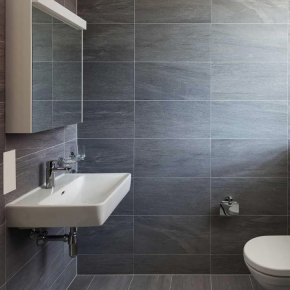
Ready-mix or powdered tile adhesive: what’s the difference? Saint-Gobain Weber ask
Ready-mix and powder adhesives have their advantages and disadvantages, and are best suited to slightly different projects. The real difference is in the chemistry of how the products dry. But what does that mean in practice? Saint-Gobain Weber explains…
Ready-mix adhesives dry by evaporation
Ready-mix adhesives dry a bit slower than powder adhesives, due to the evaporation process, so while it may have the convenience factor, it can have its limitations.
The way it dries makes it unsuitable for tiling onto floors or for porcelain tiles (with the exception of weberfix pro lite, which can be used for smaller porcelain tiles). This is due to the fact it relies on the air to dry, whereas cementitious powder tile adhesives dry chemically.
Ready-mixed adhesives are ideal for tiling areas, such as kitchen splashbacks where the levels of moisture are lower, but check if it’s suitable for use in wet areas.
These tile adhesives are ideal for smaller projects and great for quick jobs that do not need a more versatile adhesive.
Powder adhesives dry chemically
Powdered adhesives come in various grades and dry as a chemical reaction takes place after mixing. Suitable for most tiling jobs and types of tiles — including ceramic, porcelain and natural stone, as well as larger tiles — powder tile adhesives can also be used in wet areas such as bathrooms or wet rooms.
Unlike ready-mix tile adhesives, powdered tile adhesives can be used for tiling floors, and are suitable for use in outdoor projects, such as laying paving or patios. With flexible varieties available, these types of adhesives are suitable for tiling over underfloor heating, or in areas where movement is expected.
What’s more, with new innovations such as Low Dust Technology™, Weber powder adhesives are safer and more convenient to use than ever.
Classifications for tile adhesives
Whether working with ready-mix or powder adhesives, there’s a method of classification that means it’s quick and easy to choose the right adhesive for the job:
Normal or improved cementitious (C)
C1 (normal cementitious) and C2 (improved cementitious) classifications refers to the strength of powder adhesives.
Normal or improved dispersion (D)
D1 (normal dispersion) and D2 (improved dispersion) classifications regards the strength of ready-mix adhesives.
Extended open time (E)
E classifications are used for tile adhesives which have an extended open time, meaning the product won’t start to set too quickly after being spread with a notched trowel – useful for larger jobs.
Fast setting adhesives (F)
An F classification refers to a tile adhesive which is fast setting in nature, this is useful when tiling in lower temperatures where the setting process may take longer, or where there is a tight deadline.
Improved flexibility (S)
Flexible tile adhesives are denoted with two classifications: S1 (improved flexible tile adhesive) and S2 (ultra-flexible tile adhesive), which are suitable on substrates which are subject to deflection and movement.
Reduced slip (T)
T classifications refer to tile adhesives which have reduced slip – useful for applying larger or heavier tiles onto walls, keeping them firmly in place throughout the tiling process.
The adhesive required will be dependent on the scope of the project and what the adhesive needs to do. For advice on an upcoming tiling project, contact Weber’s technical team on 01525 722 100 or technical@netweber.co.uk
Saint-Gobain Weber
Dickens House, Enterprise Way
Maulden Road
Flitwick
Bedford
MK45 5BY
UK
Visit Saint-Gobain Weber's website
Visit Supplier's page
Latest news

28th March 2025
Ideal Heating Commercial announces 10-year warranty on Evomax 2 boiler
Evomax 2, the UK’s number one selling commercial wall-mounted boiler from Ideal Heating Commercial, is now available with a 10-year warranty.
Posted in Articles, Building Industry News, Building Products & Structures, Building Regulations & Accreditations, Building Services, Facility Management & Building Services, Heating Systems, Controls and Management, Heating, Ventilation and Air Conditioning - HVAC, Innovations & New Products, Pipes, Pipes & Fittings, Plumbing, Retrofit & Renovation, Sustainability & Energy Efficiency, Videos
28th March 2025
FLIR Si1-LD Acoustic Imaging Camera for Compressed Air Leak Detection
FLIR, a Teledyne Technologies company, introduces the Si1-LD, an industrial acoustic imaging camera that brings faster and more accurate compressed air leak detection to those operating on a modest condition monitoring budget.
Posted in Acoustics, Noise & Vibration Control, Articles, Building Industry News, Building Products & Structures, Building Services, Facility Management & Building Services, Information Technology, Innovations & New Products, Retrofit & Renovation, Sustainability & Energy Efficiency, Thermal Imaging and Monitors
28th March 2025
LIFTEX 2025 Seminar programme announced
Registration has opened for LIFTEX 2025. Now in its 37th year, LIFTEX 2025 is the UK’s only dedicated exhibition for the lift, escalator and access industry and takes place only once every three years.
Posted in Access Control & Door Entry Systems, Accessibility, Articles, Building Industry Events, Building Industry News, Building Products & Structures, Building Regulations & Accreditations, Building Services, Exhibitions and Conferences, Facility Management & Building Services, Health & Safety, Retrofit & Renovation, Security and Fire Protection, Seminars
28th March 2025
MCRMA welcomes ArcelorMittal UK to membership
A UK division of the global steelmaking business ArcelorMittal has become the latest new member of the MCRMA, the industry association representing the metal building envelope sector.
Posted in Articles, Building Associations & Institutes, Building Industry News, Building Products & Structures, Building Systems, Cladding, Facades, Posts, Restoration & Refurbishment, Retrofit & Renovation, Roofs, Steel and Structural Frames, Walls
 Sign up:
Sign up: